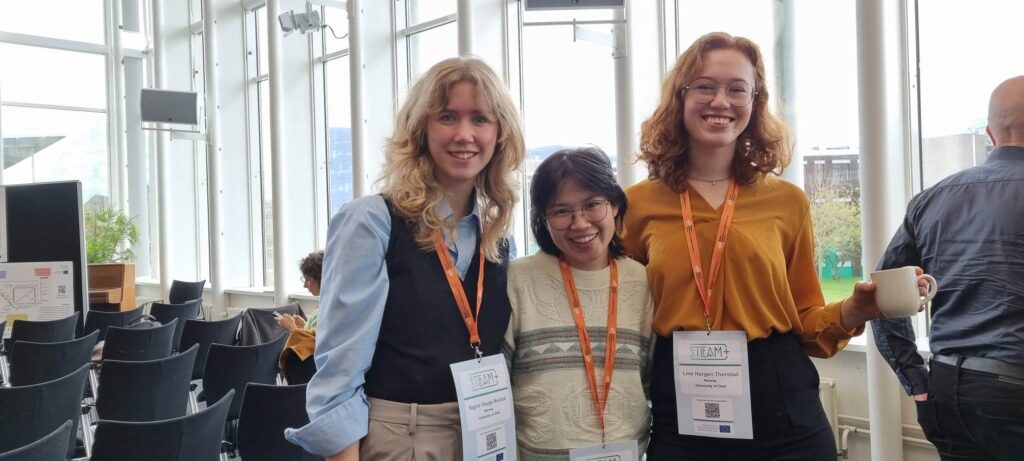STEAM+ conference in Groningen, March 30th and 31st
By Sigrid Hauge Nustad, honors student, bachelor in Psychology, University of Oslo

Groningen conference was my first meeting with the STEAM+ project. I am currently in my second semester of a bachelor’s in psychology and part of the University of Oslo’s Honours program, focusing on teaching interdisciplinary skills to students from different academic fields. Groningen conference was incredibly inspiring, as it gave me an insight into the value of interdisciplinary skills and gave me a deeper understanding of my academic Honours degree.
Over the course of two days we spent in Groningen, we got to discuss interdisciplinarity within a transdisciplinary group, thus experiencing the topic and skills we are discussing in practical situations. The Jamboree STEAM+ team invited a group of academics from different disciplines, educational lawmakers, relevant businesses, and students from different nationalities to come together and share their thoughts and experiences. The program of the conference consisted of key speakers, who discussed and enlightened different aspects of interdisciplinary education. The conference was the final meeting of the STEAM+ project and included the presentations of two education tools for interdisciplinary educational development, created as a result of the project.
Personally, I found one of the highlights to be the insightful lectures of the key speakers. The key speakers were Fabienne Beernaert, working on an interdisciplinary Bachelor of Visual Design at LUCA School of Arts in Belgium, and Crister Nyberg from the Haaga-Helia University of Applied Science in Finland. They talked about the topic of interdisciplinarity from two very different approaches, both equally important to the project of future interdisciplinary development of education. Nyberg deepened our understanding of the theoretical foundation of interdisciplinarity, by explaining the importance of knowledge and references from a broader set of fields, through philosophical semantics. Since my first academic discipline I studied was philosophy, Nyberg’s presentation arouse my interest and deepened my understanding of the philosophical importance of introducing transdisciplinarity into education. Complementing Nyberg’s theoretical approach, Beernaertpresented a practical example of an interdisciplinary educational degree available for students, focusing not only on the hard skills of academics we are traditionally used to but on the soft skills of anacademic. Raising the question “What does it mean to be an academic?”, Beernart explained how the skills of reasoning, questioning, and exploring are as important for future problem solvers as disciplinary knowledge. Interdisciplinary academics requires a dimension of personal growth for the people developing the field of knowledge. I was especially intrigued by this approach of focusing on the soft skills of open-mindedness and exploration in the students, as necessary for the education of interdisciplinary academics. If we are to tackle the increasingly complex challenges of the future, we need the personal skills to do so as well as disciplinary and interdisciplinary knowledge. We will not succeed in solving problems together if we are not able to work together and listen to each other across disciplines.
The second highlight of the conference was for me the fishbowl activity. The activity was led by the students who had followed the project from the beginning and invited all participants into a space for conversation across our different roles. As it was my first time participating in the STEAM+ project, a lot of the questions were new to me, and it felt intimidating stepping into the circle and sharing my thoughts on a fairly new subject. At first, the conversation was slightly hesitant and the pace of participants stepping in and out of the circle was slow. However, soon the conversation picked up, people participated actively, and the discussion was actively formed by the voices and views included in the group. I found this exercise especially fulfilling, as this gave me as a student the opportunity to contribute with my views and opinions and to have genuine conversations about educational topics with people in very different positions and roles than my own. I found that the fishbowl activity demonstrated how students are a central contributor to the development of a more interdisciplinary academic landscape, and the value and necessity of interaction between scholars and students in this development.
I can truly say that I found the STEAM+ conference in Groningen to be an excellent opportunity to gain insights into the importance of interdisciplinarity, and how this topic is currently being developed by international projects such as the STEAM+. I enjoyed speaking to so many insightful and brilliant people and learning about the outcomes of the project. The conference motivated me to take a more active role in exploring how I as a student can involve transdisciplinarity in my education to a larger extent. The conference showed me how students are a central part of the development of future academics competent to face increasingly complex global tasks. I wish to thank the Groningen team for hosting us, and everyone participating for making this a deeply insightful and interesting experience.
